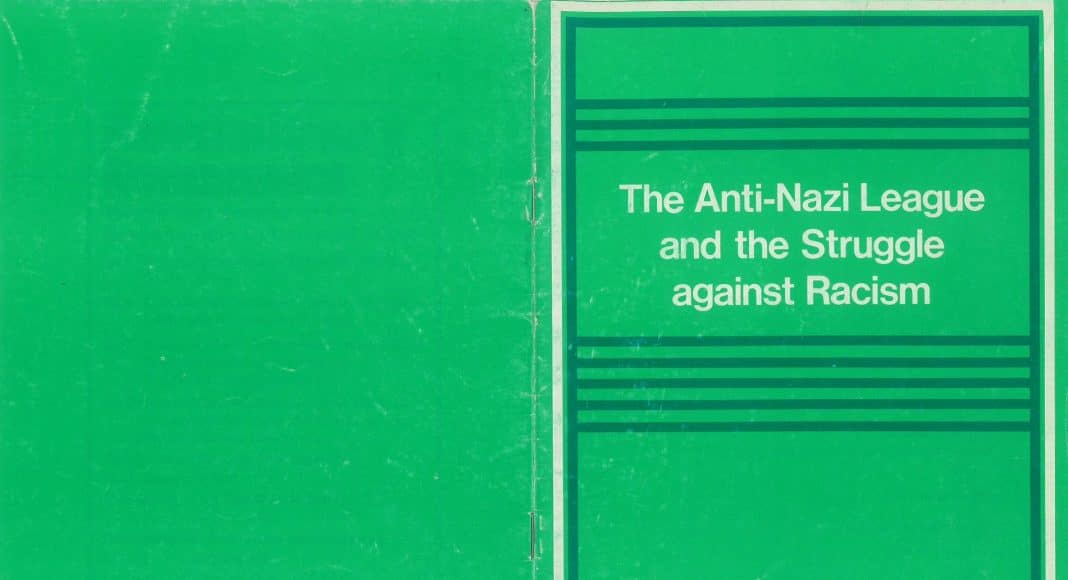The second edition of the RCG pamphlet The Anti-Nazi League and the struggle against racism, published January 1979, is available to download as a pdf here.
Excerpt from the Introduction to the pamphlet
Black people and immigrants are facing a vicious attack. The operation of immigration controls by the British state divides families, imprisons hundreds of people and causes extreme suffering. The threat of deportation hangs heavily over immigrant workers attempting to organise to defend themselves. The immigration laws also enable the forces of the state to indiscriminately harass and intimidate all black people. Police invade homes and arrest black people on the pretext of searching for illegal immigrants. The police also use the notorious SUS laws to harass black people especially black youngsters.
At the same time the effects of the capitalist crisis fall more heavily on black people. Whilst unemployment is rising generally, it is rising far more amongst black workers. Black workers are concentrated in the worst jobs and in sectors which are particularly vulnerable to cuts in public expenditure and to rationalisations. On top of this, as the actions of the British imperialist state become more openly racist, the strength of racism in Britain increases. Thus black people are subjected to racist abuse and assaults by National Front (NF) supporters and other racists.
In the face of this attack on black people the British labour movement has revealed great weakness. The trade union bureaucracy has not attempted to mobilise the trade unions to oppose racism. They have not mobilised to support black workers attempting to organise themselves as at Grunwick’s and today at Garners. Moreover, the trade unions and the Labour Party have done nothing to oppose the racist actions of the British state in particular its use of immigration controls. Indeed they have supported immigration controls. Yet the purpose of these controls is obvious. Recently Asian seamen fighting for parity of wages were removed from their ship and put into prison by the British state. Immigration controls are being used to prevent black people from defending themselves.
It is clear that if the struggle against racism is not taken up by the labour movement then the divisions that already exist will be widened. The capitalist class will find it far easier to succeed in its attacks on black workers. The whole working class will be weakened.
Black people have already shown that they will fight to defend themselves. In the course of their struggle they have shown repeatedly that they are willing to unite with white workers to defend all sections of the working class. The question that faces socialists is therefore how to win the labour movement to full support for the struggle to defend black workers.
There are many people who believe that the widespread support received from trade union and Labour Party leaders for the ANL represents the beginning of such a movement. The ANL, as its name implies, was set up specifically to combat the growth of the NF. But it is clear that attacks on black people are not coming only or indeed primarily from the NF. The major attack today is being carried out by the British state. It is the state that has introduced immigration controls, the state that uses its forces to harass and intimidate all black people, the state that imprisons hundreds of so-called ‘illegal immigrants’ in the foulest of conditions. An anti-racist movement, worthy of the name, cannot ignore these attacks but must defend black people from them. Yet the tendency exists, and is represented most clearly by the ANL, to focus only on the NF and its racist attacks on black people. The terms anti-fascist and anti-racist have come to be used almost interchangeably. To defend black people against attack from the NF is essential but represents only one small part of the work of an anti-racist movement. To defend black people today has to mean defence from the attacks by the British state.
The task of building a movement that can do this is an urgent one. But the urgency of the task should not prompt socialists to unthinkingly hail such a movement as the ANL as the beginning of an anti-racist movement. We must first decide on what political basis an anti-racist movement has to be built. The ANL must be assessed in this light — does it aid the building of a movement to fight racism?
Before we can answer these points it is necessary to understand from what source racism in Britain is gaining its strength. To kill it we must locate its roots and destroy them.




